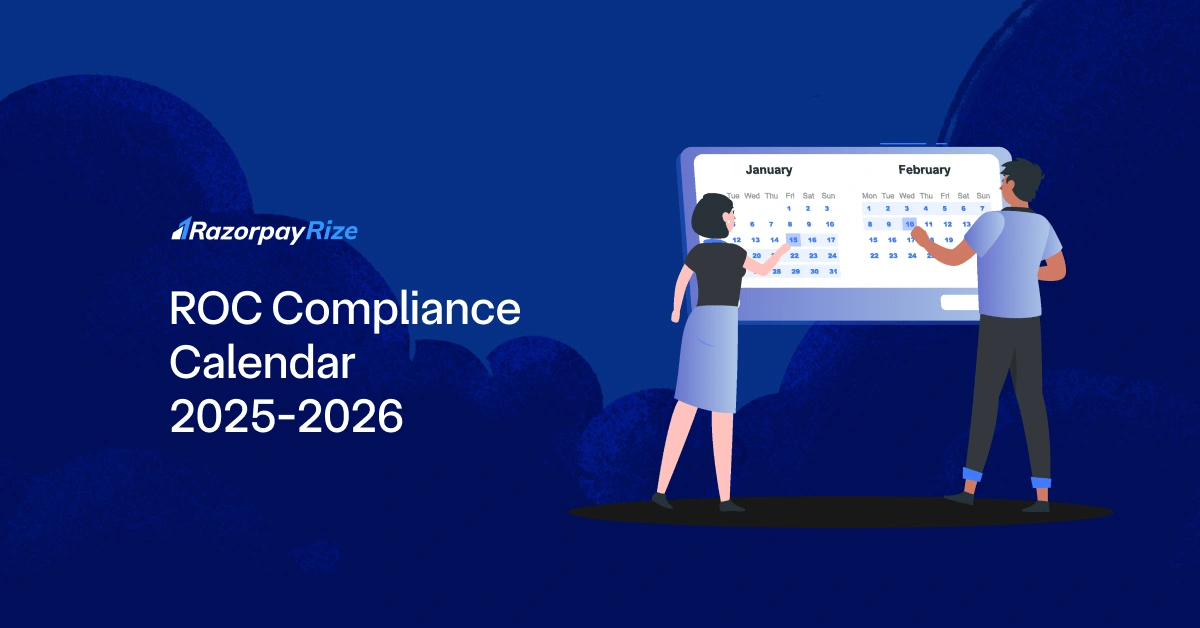Companies and LLPs in India are legally obligated to comply with annual filing requirements under the Companies Act, 2013, and the Limited Liability Partnership Act, 2008. These filings with the Registrar of Companies (ROC) must be completed annually or triggered by specific events. Timely compliance is crucial for companies and LLPs to avoid substantial penalties that can negatively impact business operations and reputation.
Table of Contents
The ROC is a regulatory body under India's Ministry of Corporate Affairs (MCA) responsible for company registration, statutory record maintenance, and ensuring adherence to the Company Act and associated regulations. Non-compliance with ROC filings can result in:
- Fines and penalties
- Legal actions against the company and directors
- Damage to the company's credibility and reputation
- Difficulties in seeking funding or partnerships
On the other hand, timely compliance demonstrates a commitment to transparency and good governance, which can attract customers, partners, and investors. It also helps avoid heavy penalties and late fees that can strain a company's finances.
ROC Filing Due Date: Detailed Calendar
Here are the key ROC compliance forms and ROC filing due dates for the financial year 2025-2026:
It's important to note that these ROC filing due dates are tentative and may be revised by the regulatory authority from time to time. Additionally, certain event-based compliances are also applicable in addition to these basic annual compliance obligations. It's crucial to keep track of the applicable due dates for each form to ensure timely compliance and avoid penalties.
Frequently Asked Questions
Private Limited Company
(Pvt. Ltd.)
- Service-based businesses
- Businesses looking to issue shares
- Businesses seeking investment through equity-based funding
Limited Liability Partnership
(LLP)
- Professional services
- Firms seeking any capital contribution from Partners
- Firms sharing resources with limited liability
One Person Company
(OPC)
- Freelancers, Small-scale businesses
- Businesses looking for minimal compliance
- Businesses looking for single-ownership
Private Limited Company
(Pvt. Ltd.)
- Service-based businesses
- Businesses looking to issue shares
- Businesses seeking investment through equity-based funding
One Person Company
(OPC)
- Freelancers, Small-scale businesses
- Businesses looking for minimal compliance
- Businesses looking for single-ownership
Private Limited Company
(Pvt. Ltd.)
- Service-based businesses
- Businesses looking to issue shares
- Businesses seeking investment through equity-based funding
Limited Liability Partnership
(LLP)
- Professional services
- Firms seeking any capital contribution from Partners
- Firms sharing resources with limited liability
Frequently Asked Questions
What is the due date for ROC filing?
The due dates for ROC filing vary depending on the specific form and the company's financial year-end. Key due dates include:
- Form-11 (LLP): Within 60 days from the end of the Financial Year
- DPT-3: On or before 30th June
- DIR-3 KYC: 30th September
- AOC-4: Within 30 days of AGM conclusion
- MGT-7: Within 60 days from AGM conclusion
Refer to the detailed list of forms and due dates in the article for more information.
How to check ROC compliance status?
You can check your company's ROC compliance status by following these steps:
- Visit the Ministry of Corporate Affairs (MCA) website: www.mca.gov.in
- Click on the "MCA Services" tab and select "View Company/LLP Master Data"
- Enter your Company Identification Number (CIN) or Limited Liability Partnership Identification Number (LLPIN) and captcha code
Click on "Submit" to view your company's master data, which includes the compliance status for various filings
What are the ROC compliances?
ROC compliances refer to the mandatory filings and disclosures that companies and LLPs must make with the Registrar of Companies (ROC) as per the Companies Act, 2013, and the Limited Liability Partnership Act, 2008. These include:
- Annual filings such as AOC-4 (Financial Statements), MGT-7 (Annual Return), and Form-11 (Annual Return for LLPs)
- Event-based filings such as PAS-6 (Share Capital Audit Report Reconciliation), ADT-1 (Appointment of Auditor), and MGT-14 (Filing of Resolutions)
- KYC filings such as DIR-3 KYC for directors and designated partners
- Other filings like DPT-3 (Return of Deposit), MSME-1 (Outstanding Payments to MSMEs), and CSR-2 (Corporate Social Responsibility Contribution)
How to do ROC form filing?
To file ROC forms, follow these general steps:
- Obtain a Digital Signature Certificate (DSC) for the authorised signatory
- Register on the MCA portal (www.mca.gov.in) using the DSC
- Select the appropriate e-Form from the MCA portal
- Fill in the required details and attach necessary documents
- Pay the applicable filing fees online
- Digitally sign the e-Form using the DSC
- Submit the e-Form on the MCA portal
Note that the specific process may vary slightly depending on the form being filed. It's advisable to consult a professional or refer to the MCA's detailed instructions for each form.
Are the forms that need to be filed with ROC monthly or yearly?
Most ROC forms are filed annually or based on specific events, rather than monthly. Some key annual filings include:
- AOC-4 (Financial Statements)
- MGT-7 (Annual Return)
- Form-11 for LLPs (Annual Return)
- DIR-3 KYC for directors and designated partners
However, certain forms like MSME-1 (Outstanding Payments to MSMEs) and PAS-6 (Share Capital Audit Report Reconciliation) are filed half-yearly. Event-based filings such as ADT-1 (Appointment of Auditor) and MGT-14 (Filing of Resolutions) are submitted as and when the relevant events occur.








.png)









